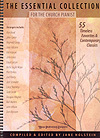- |
User Links
Deliver Me From Evil
Hymn Information
- First Line
- Deliver me from evil
- Reviser
- Bert Witvoet (1985)
- Text Source
- <cite>Psalter</cite>, 1912
- Tune Name
- HERZLICH TUT MICH VERLANGEN
- Composer
- Hans Leo Hassler (1601)
- Arranger
- Alfred V. Fedak
- Topic
- Powers of Darkness · God as: Deliverer · Lament: General · Responses: To Confession · Elements of Worship: Confession
Copyright Information
- Text Copyright
- © 1987 Faith Alive Christian Resources
- Tune Copyright
- arr. © 2012 Alfred V. Fedak, admin. Faith Alive Christian Resources
- Reprint/Projection Information
- Words and Music: Permitted with a license from CCLI.com or from OneLicense.net. If you do not own one of these licenses, please contact the copyright holder for permission.
Scripture References
- · · · ·
Thematically related:
- st. 1 =
- st. 2 =
- st. 3 =
Further Reflections on Scripture References
This prayer for deliverance recalls Psalms 58 and 64. As in those psalms, the enemies' chief weapon is the tongue, which cannot be countered with sword and shield. Only God can protect from the deadly mischief the tongue can cause. The psalmist prays for protection from those who plot against him (st. 1), asking God to foil their plans (st. 2). But the God to whom the psalmist prays is no mere bodyguard on call. He is the heavenly Ruler and Judge, who "secures justice for the poor and upholds the cause of the needy" (v. 12) and punishes wrongdoers. The psalmist asks God to sentence the plotters with the same measures they would have inflicted upon him; he declares that such justice will bring God praise among the righteous (st. 3). The versification of Psalm 140 is a 1985 revision by Bert Witvoet of the text in the 1912 Psalter.
Bert Polman, Psalter Hymnal Handbook
Confessions and Statements of Faith References
Further Reflections on Confessions and Statements of Faith References
God’s children are not called to come before God’s throne with a list of accomplishments, or merits or goodness; they are called, says Our World Belongs to God, paragraph 26, to come with the humility that “…offers nothing but our need for mercy.” Such a cry for mercy comes from our “dying-away of the old self” (Heidelberg Catechism, Lord’s Day 33, Question and Answer 88) which expresses that we are “genuinely sorry for our sin and more and more…hate and run away from it” (Heidelberg Catechism, Lord’s Day 33, Question and Answer 89).
The gifts of renewal and pardon come only “through true faith” (Heidelberg Catechism, Lord’s Day 7, Question and Answer 20) and are “gifts of sheer grace, granted solely by Christ’s merits” (Heidelberg Catechism, Lord’s Day 7, Question and Answer 21). The very act of faith is to plead for his mercy.
Deliver Me From Evil
Additional Prayers
Deliver Me From Evil
Tune Information
- Name
- HERZLICH TUT MICH VERLANGEN
- Key
- C Major
- Meter
- 7.6.7.6 D


 My Starred Hymns
My Starred Hymns






